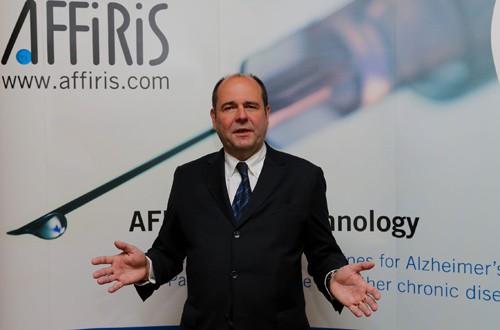
Austrian biopharma company AFFiRiS says its drug candidate AD04 has become the first therapy to show a disease-modifying effect in patients with Alzheimer’s disease.
Results of a phase II trial indicate that AD04 is “the first drug ever to demonstrate clinical and biomarker effects consistent with disease modification,” according to the company, which says its effects were achieved for “at least 18 months in 47 per cent of patients.”
AD04 a peptide-based vaccine targeting beta amyloid, the material that makes up the characteristic amyloid plaques found in the brains of Alzheimer’s patients.
Drugs designed to dissolve or block the formation of amyloid plaques have consistently failed in late-stage clinical trials to date, often with encouraging results on cognitive measures in phase II, which has led to suggestions that the approach should be tried in ever-earlier stages of the disease, ideally long before symptoms develop.
AFFiRiS, however, believes its data reveals a more profound impact using its vaccination approach. Its study enrolled 332 patients with early Alzheimer’s disease and showed that – in addition to achieving cognitive/functional stabilisation or improvement of 47 per cent – there were also positive effects on the volume of the hippocampus, the region of the brain where cognitive and memory functions are located.
Patients treated with the vaccine showed a reduction in the decline in hippocampal volume typically seen in patients with this form of dementia.
“This correlation of significant clinical and biomarker effects meets EMA’s and FDA’s definition of disease modification in the context of a compound with a consistent mode of action,” commented Frank Mattner (pictured), AFFiRiS’ chief scientific officer and co-founder.
AFFiRiS’ R&D approach is to develop a portfolio of peptide vaccines against various forms of a drug target like beta-amyloid and test them in parallel. So far it has four Alzheimer’s candidates in trials and in this study a second – called AD02 and formerly considered the most promising option – was also tested.
While AD02 also had an impact on cognitive measures (with 24 to 31 per cent of the patients showed cognitive/functional stabilization or improvement), it did not have any effect on hippocampal volume.
Mattner said this parallel testing approach, which AFFiRiS refers to as ‘clinical maturation’, makes the process of clinical development more efficient and reduces the financial risks associated with trials. AD02 will now take a back seat while the company places more emphasis on AD04’s development.
In 2008, AFFiRiS signed a £334m ($560m) deal with GlaxoSmithKline (GSK) granting the latter exclusive rights to its vaccine programmes targeting beta-amyloid for the treatment of Alzheimer’s disease, which was extended in 2011.
Meanwhile, AFFiRiS is also using this approach to test vaccine candidates for Parkinson’s disease, and is scheduled to report clinical trial results for this programme within the next two months.




